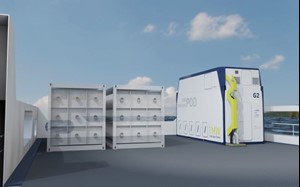News
DNV awards Approval in Principle to HAV for containerized H2 system for ships
Six months after announcing its plans to launch a deck-based containerized H2 energy system for ships, HAV Hydrogen unveiled details of the system that received Approval in Principle (AiP) from DNV. The AiP is an important milestone for HAV Hydrogen in bringing the new zero-emission pod system onto the market and engaging with customers on the first commercial installations of the system.
“We have developed and received an AiP for a turnkey engine room. The AiP is based on a 20-foot container that not only contains the hydrogen fuel cells, but also the equipment required to safely run it. This includes ventilation, cooling, safety systems, control system, DC/DC drives, fuel distribution system and other technical installations,” said Kristian Osnes, managing director of HAV Hydrogen.
The zero-emission pod system is a turnkey, standalone power pod where all support and safety systems as well as electrical power management are included. By using 200-kW H2 fuel cells, the system is flexible and can easily provide 1,000 kW within the footprint of a standard 20 container. By combining multiple containers, using larger modules or dedicated space below deck, multi megawatt energy systems will also be available.
Installed effect can be used for the main propulsion systems, or for additional power supply on board the vessel to comply with green operation standards. Output effect will be dimensioned to provide optimal zero emission power in desired operating situations, sailing patterns and vessel type.
Quayside, the H2 system can ensure sufficient green power supply to the vessel, which does not need to rely on onshore charging infrastructure to achieve zero emission status.
“The H2 system is a simple yet effective enabler of green shipping. It can either be utilized as a retrofit option for vessels that have not already been prepared for a conventional retrofit installation below deck, or as a complete plug-in module that de-risks the yard installation for newbuilds,” said Kristian Osnes.
The basis for DNV’s AiP is compliance with the safety principles of DNV rules for fuel cell installations, gas fueled ship installations, containerized systems, the IGF Code, and IMO interim guidelines for the safety of ships using fuel cell power installations.
“We would like to congratulate HAV Hydrogen AS on being awarded the AIP for their Hydrogen Containerized Power Plant,” said Monika Johannessen, Head of Department – Gas Technology, Piping & Safety at DNV. “To keep shipping relevant over the long term, we need every possible option on the table and H2 can be an important part of the shift towards more sustainable shipping. We would like to thank HAV for placing their trust and confidence in DNV’s expertise to help them demonstrate that their system is in-line with the most advanced technical standards in the industry.”
The system is designed for operation in air temperatures between –20 to +35 C° and seawater temperature from 0 C° to +32C°.
HAV Hydrogen has developed the containerized, deck-based system to fast-track the commercial use of H2 as ship fuel. Since announcing its intention to launch a containerized, deck-based H2 system, HAV Hydrogen has been inundated with requests from shipowners.
“There is significant interest from shipowners in multiple industry sectors. We have been contacted by companies that operate within offshore wind, oil and gas, RoRo shipping, cargo, inland shipping and fishing. They acknowledge that our containerized solution can be the quick route to zero emission for their vessel types. Given that necessary infrastructure is in place, all a shipowner needs to do is to clear sufficient deck space and hook it up to the vessel’s power system,” said Kristian Osnes.
Broad European and international regulatory support, and rapid development of H2 supply in relevant harbors, is expected to drive adoption of H2 as ship fuel. HAV Hydrogen considers short sea cargo, inland water cargo and passenger transport to be the most relevant industry segments for its containerized zero-emission pod system, while offshore wind is expected to grow in relevance as emission regulations continue to be tightened. According to international vessel databases, including sea-web and the European Commission’s Market Observation Inland Navigation in Europe, there are approximately 2,500 short sea cargo vessels, 7,000 inland water cargo vessels, 1,300 passenger transport vessels and 2,500 fishery vessels in Europe alone.
HAV Hydrogen will be ready to start manufacturing of the Zero Emission Pod H2 containers during the second half of 2023, aiming for the first deliveries in 2024. As a specialist supplier and integrator of maritime fuel cell solutions, HAV Hydrogen will offer support to shipowners, ship designers and shipyards to ensure an optimal design, integration and installation process.
The containerized H2 solution is based on the H2-based energy system developed in the groundbreaking FreeCO2ast project, which has received approval for a maritime H2-based energy system with a liquid H2 tank below deck.


